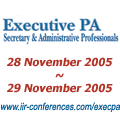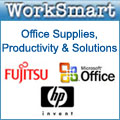
 If you're a PA or a secretary in a small to medium size enterprise, an SME, chances are you'll be involved on a daily basis on selecting and buying products and services for your firm. What were the last things you bought? Stationery? A new desk and chair for a colleague? Was it you who bought the photocopier?
If you're a PA or a secretary in a small to medium size enterprise, an SME, chances are you'll be involved on a daily basis on selecting and buying products and services for your firm. What were the last things you bought? Stationery? A new desk and chair for a colleague? Was it you who bought the photocopier?
Some PAs have bought extraordinary things like new workshop gates, the boss's car, and even an arc welder, so I'm told! PAs in large organisations also often have budgets for high-ticket items, and think nothing of spending thousands of the firm's pounds on kit for the office. It's just another thing on the To Do list.
Whatever it is you are buying, you need to make sure you're getting the appropriate kudos for the job you're doing. You may take it all in your stride, and just think of it as "keeping the office running". But in fact, what you're doing is exercising a management skill, which you must make sure others know about.
To start with, let's ramp up the language. If you are responsible for choosing and buying items for your firm, you can now add "Procurement and Purchasing" to your CV. In his excellent book for small businesses start-ups and entrepreneurs, "Start up and run your own business", Jonathan Reuvid gives this clear definition of the two sides of the buying role:
Procurement:
- the setting of specifications which you require products and suppliers to meet
- selection of shortlisted suppliers against specifications,
- negotiation of purchase and supply terms, from prices and minimum order value to payment and credit terms, and from delivery times to return procedures.
Purchasing:
- placing orders against agreed terms and approved suppliers on a timely basis
- progress chasing of undelivered product
- rejection and return of sub-specification product
- approval of invoices for payment.
So, next time you're working out exactly what you want the copier to do, and getting hold of three suppliers who fit your needs, you are in fact involved in Procurement. And when you call up your preferred supplier and give them the order, you are in fact, Purchasing.
Jonathan Reuvid offers some more concise advice in his book, and all those of you now working in Procurement and Purchasing will find it useful. He explains the four main business criteria you should apply, when making purchasing decisions, especially for high-value items:
- Fitness for purpose
Don't consider buying equipment that is unnecessarily refined or of a capacity in excess of your business needs (eg, your choice of car or telephone switchboard). On the other hand, be sure that it will do the job for which you need it. In particular, if you are financing a capital item by leasing or rental, be careful not to commit yourself to inferior specification or lower-capacity equipment than the business will need a year or so before it can be replaced. - Cash flow
Some equipment manufacturers may offer financing packages that demand lower monthly payments than others, or that can be procured from third party finance providers. If the product specification and quality are acceptable, this may determine your ultimate choice. However, preferential payment terms may not be sufficient to offset the risks of an inferior guarantee, high servicing costs, or an unreliable product, which can disrupt your business and cause expensive repairs and replacements. The net effect on cash flow, including lost sales, could be severe. - Net profit effect
The higher the net price of the capital equipment, the greater the charge against profit is likely to be – however preferential the financing package is. This is a similar consideration to the impact on cash flow with one important difference. Remember that, in addition to running/operating costs, there is the cost of depreciation charges which must be taken against profit if your business is purchasing the asset. (Depreciation, broadly speaking, is the amount the equipment you have bought goes down in value as it ages. So, a new copier is clearly worth more than a two-year old copier, and that loss in value needs to be included in your calculations.) - Competitor practice
For large pieces of equipment and plant, check what equipment your most effective competitor uses in its business. Maybe you can gain a product advantage by using improved equipment which will justify the incremental cost. Of course, the argument could go the other way. If you spend less on equipment, you might be able to afford to offer your customers additional service benefits, which would still be most appealing.
For smaller items which you buy more regularly, such as consumables, Reuvid suggests that you do not need to spend so much time deliberating. He gives these as the critical buying factors:
- price
- quality
- reliability of supply
- delivery time
- payment terms.
So, next time you are asked to investigate the options and find suppliers for a large piece of equipment in your office, let the boss know that you're doing some procurement and purchasing. If you produce results for them to look over, head up your sheets "Procurement and purchasing: new office furniture". And don't forget to drop in a few business phrases, such as "fitness for purpose", "effect on cash flow" and "depreciation".
And finally, if this is a regular part of your job, make sure you add procurement and purchasing to your CV. It's a management skill that you should be shouting about.







